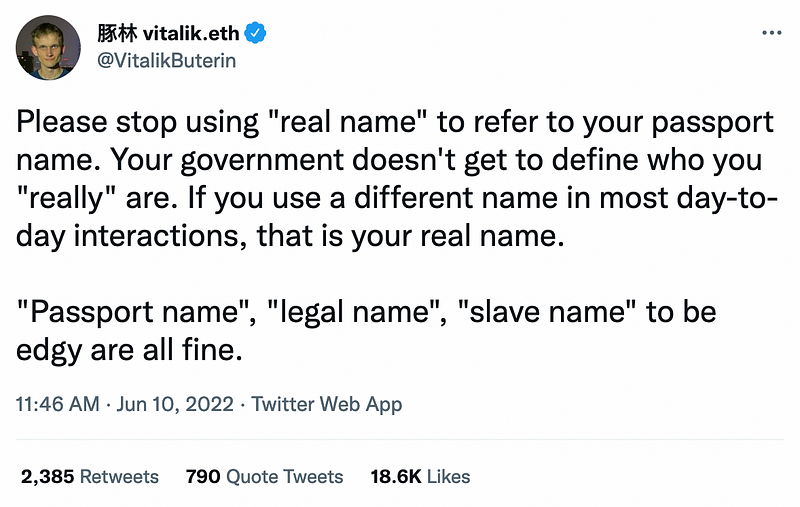So What’s Your “Real Name”?

So What’s Your “Real Name”?
Aren’t there people you would love to chat with? For me, it would be someone like James Clerk Maxwell, John Napier or David Bowie, and I’d ask them about their genius ideas. And, I’ve been very lucky to chat with some great people, such as Len Adleman, Marty Hellman and Bruce Schneier, but there’s one person who would definitely be on my list to chat with … Vitalik Buterin — the co-creator of Ethereum.
The thing about Vitalik is that he’s not your typical academic who writes academic papers full of mathematical symbols. He’s a careful thinker and a meticulous worker. Perhaps he’s the opposite of Richard Branson or Elon Musk, and that’s why he’s so interesting? For Elon Musk, it’s all about the big picture — as it should be for a business leader — but there’s a need for those who look under the hood, and can make sense of complexity, and explain things in a simple and engaging way. He’s a great teacher … and that’s one of the best things that anyone can be.
And, so, this dropping on my Twitter feed [here]:

It’s actually a deep thought, and takes a while to see the significant. My real name is “Bill”, and that’s what people refer to me as. It’s as real as I am. My academic name is “William J Buchanan”, and when I write papers or travel with my passport, it is that name I use. But is that my real name? And, I suppose, Vitalik is looking back at a world where the governments of the world give us all identifiers, and that is how they interact with us. Basically, we become numbers and formal surname identifiers. It’s a 20th Century view of the world. Your surname and your date-of-birth is basically your fundamental idenitifier.
In 2017, I outlined how I couldn’t vote in the Scottish Independence referendum as my son (who has the same name as me) had been registered against my identity:
And, so, we progress into the 21st Century, and I still have no real digital identity for the access to government and health care services. I am still a number — a CHI number (in Scotland, the NHS uses this to identify a citizen) or an NI (National Insurance) number. We are still using our paper-based methods of trust, and can only see scanned versions of our signature as a way to give any legal certainty. I continually still have to sign my name for legal documents, and I just wave a line across the page. It isn’t me any more, and no-one could really say that was my signature.
So, let’s build a new world, and put the citizen at its centre. For decades, I have been attending conferences which continually focused on “putting the citizen at the centre of public services”, and very little ever changes. To build a new digital world, we need to start with the citizen and work out from there. Viliak’s post hints at you having ownership of your identity, and it is not be defined by our governments. You are real, our simplistic government identifiers are not you.
So, come and collaborate with the first research lab which focused on identity … the Blockpass ID Lab, and put the citizen first.